Still on Slitherine’s 2013 press conference in Fredericksburg, Virginia (United States of America), I had the opportunity to talk with Erik Rutins, Matrix Games’ Director of Product Development (on the right in the picture) about Distant Worlds. I asked Erik about the real-time 4X game’s state when it was first picked up and signed by Matrix Games, the developer-publisher relationship (the developer being Elliot Gibbs from CodeForce), the greatest design challenges and Erik’s personal favorite aspects about the game. In the second part of the interview we’ll cover the future of Distant Worlds, further improvement, expansions, and Distant Worlds 2! So, enjoy this interview’s first part. The second part should be up in the next few days.
SS: Tell us a bit about Matrix Games. How, and when did it all started? And, could you also tell us a bit about yourself? What did you do before working on Matrix Games?
Erik: We founded Matrix Games officially in the end of 1999. Initially, there were five of us and we had a very limited set of projects that we were working on. They were all either internally developed or the developers were working with us, working very closely. So, it was a very full involvement. As we grew, we started to expand and took more developers on-board, and that’s when it went a little bit more broad spectrum across the board. When we first started I was working in programming and also advised on programming and stuff like that.
Before Matrix I had two businesses. One was a computer consulting business where I did custom programming and various kinds of applications as general computer consulting. And, I worked with small clients and also some large companies writing custom applications for them, most in the pharmaceutical industry. And, I also had a business together with David Heath, one of Matrix’s co-founders called the Gamers Net which during the dot-com boom of the nighties was the biggest website for strategy gamers on the internet, on that point in time. We sold that in 1999. Unfortunately, the company that took it on at that point didn’t do much with it, but the money that we had leftover from that went into founding Matrix.
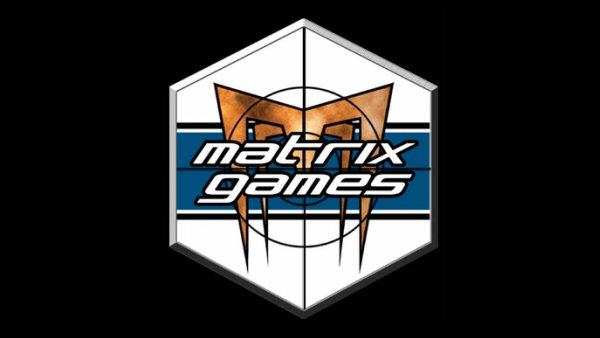
SS. What other games have you helped design and program before getting involved in Distant Worlds? And, what exactly is your role on Matrix Games, and particularly on Distant Worlds?
Erik: My job in Matrix Games is basically director of product development. So, what that means is that almost every single game that Matrix works on, I’m involved in. This means from the point in time that we sign a developer up. Some of them, when we fist sign them, the game is pretty much finished, and in other cases the game has barely begun. But, whatever the case, we see something there that we really like. So, we talk with the developer and work out with the developer, you know, how we can best support them. How we can best both achieve their vision and also tailor their game to get our community really excited. And it’s my job to basically figure out as part of the overall team how to best do that. I offer advice. Sometimes, the advice is thought, sometimes I offer unsolicited based on experience.
Regarding Distant Worlds, I try to remain behind the scenes, I mean because I’m involved on the publisher side. So, I feel like my job is to support the developer and work with them and give and help them in any way they need. In the case of Distant Worlds, it happens to be one of my favorite games of all time. And I happen to really enjoy working with Elliot. We have a very good relationship. How it worked was, Elliot had a vision. And, when it comes to design we have meetings. So, before we start working on a new expansion, Elliot and I have a meeting. Publisher and developer. And, we figure out what this new expansion is going to be. And we go through sort of a combine where we each have ideas as to what the design is going to be. We combine them, we have design sessions and we finally come out of that with a design document. He and I worked together on fleshing out that design document. My main role is to reinforce him. So, I try to give him as much inspiration and as much room to maneuver as possible, and any time he needs something, I try to provide that. And if there’s an area where he’s asking for more help, or something like that, I jump right on and give him what he needs.
SS: So, and what type of games do you like to play? Could you give a few examples of your favorite ones?
Erik: I’ve been a gamer since I was like six years old. Distant Worlds, I mean, I don’t want to offend anyone else but I can say without any bias, Distant Worlds is my favorite sci-fi 4X game of all time. Now, if we go way back to very early games, then Cosmic Balance, yeah, that would be one of my favorites. Back to the more recent games, that interest continues. So, I was going through things like Stars! and Space Empires, Master of Orion and Master of Orion 2. And, more recently I mean, there’s a lot of other space 4X games like Armada 2526. Things like Endless Space and StarDrive, you know? I’m interested in all of those.
I mean, I don’t have a lot of time to play games that aren’t our games, that’s just the nature of things. But, I do tinker around with them. I also like to support developers that aren’t ours. That’s why we got into this business, to make the games we like to play. So, just because I’m now also working on these games it doesn’t mean I don’t like to play other games. So, yeah, I mean, I’m out there. The main thing is, I don’t get to play them very much. But I pick up a copy, give the developer some support that way, with my money. I tinker around with their game, and I’m glad there are other people out there doing it.
SS: To have an idea on the manpower required to make such a complex game, how many people were involved in making Distant Worlds? And, what were their roles?
Erik: So, it was the developer Elliot Gibbs from CodeForce and myself from Matrix Games. We also had a few artists in the game, as for some people for the sounds and music. And, we also had all the Matrix Games’ publishing staff to help with testing, distribution, marketing and PR.
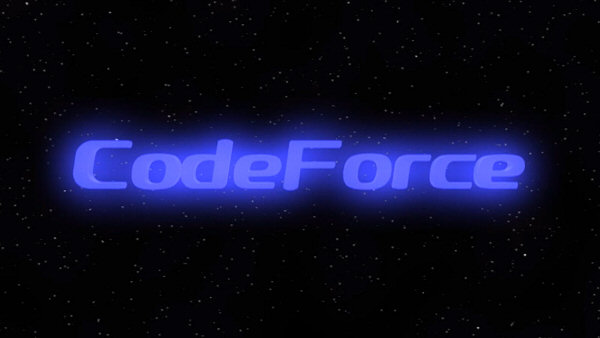
But, this was not just us, obviously we got testers on-board at pre-alpha or early alpha. Within our testing system we have testers that have worked with us on many games and we keep track. So, we know which are the guys who are really going to give us the best feedback or the most reliable and so on. So, we took these veteran guys and we signed them to help us out with that. Because, the more eyes you have on something like this the more ideas you have. It’s rare that everything comes from a single person. So, I want to give them credit as well. We got some great ideas from them during that process. But, by the time we finished the Distant Worlds base game, it was pretty much just me and Elliot working together to plot out the future course of Distant Worlds.
SS: And, in which phase did Matrix Games, and you in particular, got involved in Distant Worlds’ development? And, how mature was the game at that phase? Was it close to what we saw in the original release or would you say it was still a bit far from that?
Erik: When Elliot brought Distant Worlds to us he had a very good vision of what he wanted it to be, and he had a lot of stuff already done. But, it was very much needing art and it was very much needing fleshing out. And so, we worked with him, I guess it was probably for one year and a half, or two years. After we signed Elliot up for the first Distant Worlds game, we worked for about two years. We funded the art for it and I worked with him on the design side as well as several other people in the company for the first release, to get it to the point where we all were really excited, you know. Elliot proved to be just a wonderful guy to work with throughout that process.
But I mean, when Elliot came to us, the game had a lot of features already, it already had that living galaxy feel to it. But, it wasn’t fleshed out in many ways like the art which was obviously all placeholder. There was a lot that got done with the interface after Distant Worlds came to us. There was a lot that got done in expanding things like the trade and resource system, which were more of a framework than fully expanded. The tech trees and things like that. But, the core game, the core idea of it, of that you want a galaxy that is really, you know, alive and interesting and has all these unusual and rare things going on. And the private sector, that’s Elliot’s idea and it’s magical. We saw that and we said, this is fantastic and we can work with you to make it even more fantastic.
Elliot has been, in general, one of the easiest developers to work with, in terms of his receptiveness to feedback. He’s really exceptional. And I think you see this in the community sense, because the community gives us feedback and we look through that feedback and I discuss it with Elliot and we figure it out. I mean, there are technical limitations sometimes, to what can be done. But, you know, in general he’s totally in sync with us as far as the community has a great idea and it will make the game better, he just says: “Let’s do it! Let’s get it in there”.
But I would say that when Distant Worlds came to us it was pre-alpha but not much pre-alpha. The core of the game was there. The magic was there. It just wasn’t any close to polished yet.
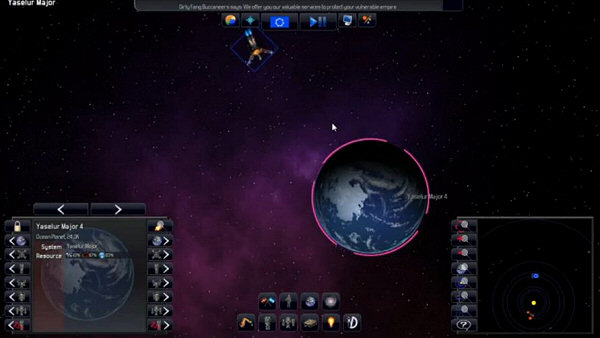
Distant Worlds (2010) - A humble beginning with great potential
SS: I believe the decision to go with real-time was probably already made before you got in? Was that aspect still discussed?
Erik: We’re not anti real-time. We think real-time has a very good role on strategy games and we have other real-time games as well, including hardcore wargames like Command Ops. And, we have pseudo turn-based real-time combination games where you hit the turn and then you watch things execute in real-time. But as to Distant Worlds, when Elliot came to us, it was a real-time game. All we needed to do was basically look at it, play it and realize that real-time worked really well with the exploration living-galaxy aspects of it, so that was the right decision.
At the same time, you know, as we were working on Distant Worlds, we were also cooperating with the developer on Armada 2526 which originally we did the retail release for. We didn’t have the exclusive rights but we also did the beta testing on our side, and that was a classic turn-based 4X. So, we’re agnostic on that. The main question is: “Does it fit well with the design?”, and there’s a number of these different basic choices within the game. “Is this the right choice for the rest of the stuff you want to do with this game?”
But, the original Distant Worlds had no speed settings. So, adding in all the different controls to speed up and slow things down was something that came in during Distant Worlds development. And you can also pause the game at any time. If you weren’t able to pause the game and do stuff, we would have a problem with that, for this game. Because, for this type of game where you’re controlling potentially like half a galaxy, you have to be able to pause and still do things. And that’s also why there’s the queuing mechanism and there’s the automation, and there are a lot of other things that allow you to tailer the gameplay and to tailor your involvement. Because we realize that the classic issues with 4X games is you get to a point where your empire grows to a certain size and you just can’t handle it anymore. Even in turn-based ones you’re spending so much time per turn micromanaging your different colonies.
Obviously, there are still people who want to manage everything, and they can. But, we wanted to make sure the people who didn’t want to do that could basically have a lot of it either controlled by the AI, or the advisors. Or, you know, they could just get out of the micromanagement if that wasn’t the way they wanted to run the game.
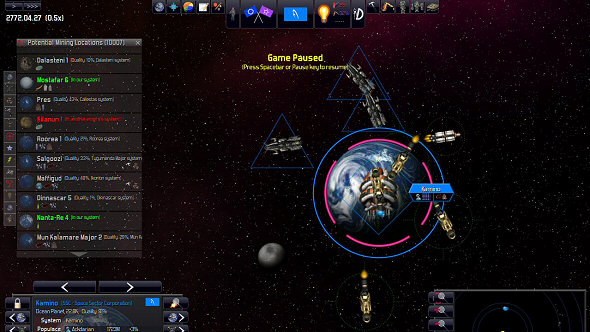
Distant Worlds: Return of the Shakturi (2010) - From the potential to the actual thing
SS: What do you think were the tougher challenges you had to solve, or help solve, when you were co-designing and programming Distant World along with Elliot?
Erik: I would say that for the Distant Worlds base game, the number one challenge was the economy. And, it actually did defeat us in the end. We worked on the economy quite a bit during Distant Worlds’ pre-release development, because it’s very complex. It was something that evolved. The core was there, and it became more sophisticated as we went through the development of the original Distant Worlds. So, by the time we got to release we were pretty happy with it. We were pretty happy with all the gameplay choices that were enabled for the player because a lot of Distant Worlds also is about emergent gameplay. It’s about setting systems up that create this living galaxy and these realistic interactions, and then out of those emerge these other gameplay choices just because you know that your actions are sort of taking place in this working functioning and living galaxy.
When you consider all that, that’s sort of what we’re aiming for and we were trying to get all the economic choices as far as, you know, mining, distribution of resources, and the different number and types of resources, what the maintenance costs are and these other expenses you could have. What was paid for? What was not paid for? What was paid for by the state? What was paid for by the private economy? And, how much control the player should have? All that type of stuff was our biggest challenge.
Where I say the economy beat us in the end was that not long before we actually released Distant Worlds, in very late beta, we made some last ground changes and we actually broke the economy. But, we were so busy testing, and the surface appearance, and this is one of the dangers sometimes when you get too close to a game. We knew how to play the game really well, so we could overcome a lot of issues without realizing that we were really overcoming them. And, so, when we broke it, there was a bug that broke part of the economy in late game, and we didn’t actually really realized it broken it because we were sort of just playing it in a way that worked until we got to release, and that was actually one of our rudest surprises, the initial release.
The first week was kind of rocky because of that. Obviously, there were other bugs and stuff that we had to address. There was a fair amount of bug fixing, but the economy was our biggest embarrassment, shall we say (laughs). And there was this great feature which didn’t have this bug before and we released with this bug, and we were: “Oh my god, what have we done?”. We fixed it quickly. Fixing the economy big bug was quick, and after that, when we started getting feedback from thousands of players, more balance issues came up, things we hadn’t spotted. The reality is we’re human, so, all of us, and the testers have certain play styles. And we try to account for as many play styles as we can, but sometimes we just hadn’t thought of something and it didn’t come up from the testers either. So, I would say the economic balance was probably the hardest challenge.
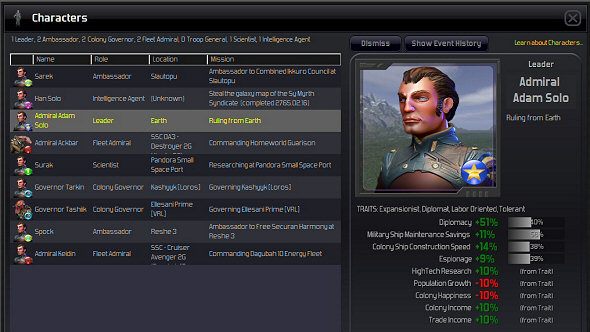
Distant Worlds: Legends (2010) - Leaders, more UI improvements and a ton other great things
SS: Do you feel the economy is better now, with Shadows?
Erik: You know, I thought that by the end of the Distant Worlds base game, the economy was where we wanted it to be in the initial design. But, after both our own ongoing experiences with the game, and the player feedback from the game, it was clear that there was a lot more we could do with the economy. And so, we kept working on that around the edges. And, with Shadows we finally went and said: “Ok, we really need to focus on the economy”. We wanted to tie in first the pre-warp era and the pirate gameplay. And both of those have major effects on how the economy works. And, we also wanted to address the issues raised by the players. This is a tricky area, because in terms of economic balance you get a lot of players that are playing Distant Worlds for the first time and they still find it too hard, and you get players who played it for a while and really understand it and find it too easy.
One of the things we implemented in Shadows was a real demand for resources that didn’t arise from activity but just from existence. We started this in Legends, where we had bonuses for certain resources. It had various effects. In Shadows we basically said: “Well, you know, to grow, this planet needs this, this colony needs this”. And, your colony ship, when it starts the colony, it provides a certain amount of resources, but eventually if it’s not tied into a trade network, if trade can’t get to it with required resources, your growth will be pretty much be gonna go to nil. Which also helped address another concern balance-wise that we had which was that it was too easy to expand quickly and to create a lot of colonies and not worry as much about making sure they grew and making sure you get to defend them and so on.
Shadows’ pirate economy was very challenging to balance because we wanted to enable many pirate play-styles and not make it too hard for someone who was playing the pirates for the first time. The first wave of testers that came to experience pirate gameplay for the first time were just like: “What am I supposed to do with this?”, because the pirates were way too hard to play. We didn’t have all documentation done and they didn’t know all we knew about the design. So, it was really not fair (laughs), for them. And, we started gradually scaling it back and scaling it this way and that way, and adding more tweaks and options and finally we got the pirates to where we wanted them. And that was on-going, I mean, along with everything else that was under Shadows’ development, the balancing of the pirate economy was ongoing for most of the development, it was constantly being tweaked and tested, and tweaked and tested.
Because it’s not a very simple economic model. It’s not, just: “We know this planet gives this much income, so add it up!”. “This is how much the cost is going to be deducted”. A lot of this is very dependent on: “Ok, which trader is bringing these resources where and when it’s gonna arrive? Who’s refueling where? How many ships is the player going to decide to build? How many times are the pirates going to raid?” It’s all dynamic, so we had to sort of more establish where the bounds were going to be, than be able to be very deterministic about it.
So, Shadows was our chance to really, I mean we revisited the diplomacy a lot in Legends, Shadows was our chance to really revisit the economy and try to balance it up. I’m pretty happy with the Shadows economy balance.
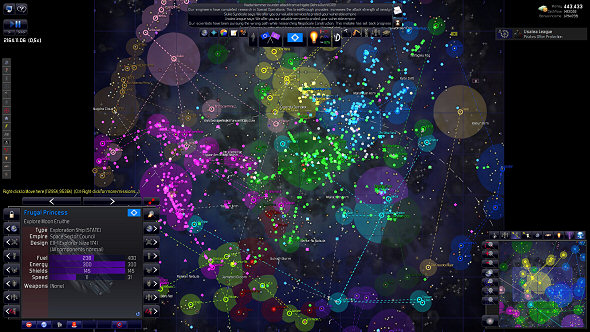
Distant Worlds: Shadows (2013) - Pirates, expanded ground combat and much better performance
SS: What are your favorite aspects about the game?
Erik: I think one of my favorite things is the fact that there’s a living galaxy. That you’re watching the galaxy live and go about its business, and you’re existing in whatever level you want to exist in it. What a lot of people have mentioned on the forums as well, is the fact that you can focus as small as you want or grow out as big as you want it terms of what you’re controlling and what you do. This is something I try to emphasize to new players as well, who are feeling a bit overwhelmed, is you really can go in if you want and just focus on one system even just looking at one ship and try to make decisions to that one ship.
So, I’d say the living galaxy. And that includes the storyline embedding on the galaxy too. If you haven’t played Distant Worlds before, I think the first time you go through the full storylines and find a lot of those hidden things, some of which are storyline event-based, some of which are just randomly, you know, placed extra things and not always in obvious spots. I think there’s a joy of discovery, and because it’s just a big galaxy because you literally can have up to 1500 star systems, there’s just a lot to explore. It can take a while, even when you’ve explored the obvious places there’s still non-obvious places where you might find something interesting. So, I mean I think that the first part of the game and in a core sense the living galaxy aspects, I just love that.
My next favorite thing is that it has most of the systems of my historically favorite sci-fi, 4X type, war computer games over the years in it, and you can choose what level of detail you work on them. So, that’s again the difference between the manual, advisor and automated. But it’s not just that you can turn things to manual, advice or automated. It’s that if you do choose to go manual there’s enough to do there that is very rewarding. In other words, I think comparably to many other games it has got a very rich experience if you do things manually. Either if you control your technology research yourself, or you’re controlling the ship design or ship building, diplomacy or espionage yourself. I think all of those can be very rewarding in manual control.
So, it’s that. The combination of the depth of it and the ability to turn that depth on and off selectively. There are times when I sit down, whether it’s for testing or just for fun and I’ll say: “Well, this time I feel like running this part of the game. This time I feel like running this other part of the game. This time I feel like running everything by myself.” All those things, that flexibility, is really appealing to me. Because I know every time I sit down to play Distant Worlds, or any game, depending on my mood, depending on my energy level, sometimes I find myself thinking: “Well, I don’t know if I can handle that one now, or that one is too light for me now, and so on.” With Distant Worlds, I sit down and know that almost whatever combination to what I’m in, I can tailor it to suit my needs.
To be continued…
Here’s the second, and last part of the interview, where Erik talks about Distant Worlds’ further improvement, expansions and Distant Worlds 2!

37 Comments
Related Articles:
- Distant Worlds Giveaway Contest! [RESULTS]
- Matrix Games Holiday Sales – Distant Worlds Series At 36% off
- Distant Worlds: Universe – Release Date, Price and More
- Distant Worlds: Shadows Not This Year and Matrix Info Dump
- Distant Worlds Interview Part 2: Further Work and Sequel


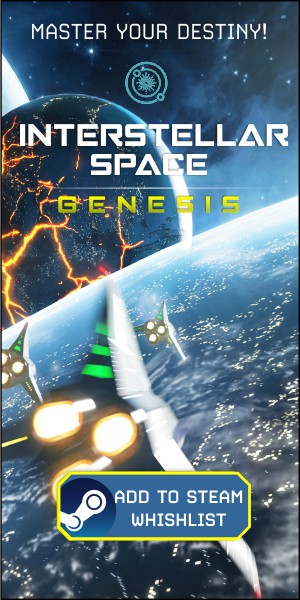





Really interesting article about one of my favorite games. Its fascinating to hear details about how DW arose from its humble beginnings and the various challenges they faced.
I’d tend to agree with Eric that one of the best parts of the game is the ability to selectively choose where to focus your attention from game to game, making it a different and interesting experience every time. I bet that this probably contributed greatly to its popularity too. If you are uncomfortable or overwhelmed with a particular setup or style of play, then you can always narrow or broaden your focus from the default, customizing your game-play until it closely matches your taste. That’s a very clever way to cater to an enormous range of different people’s play-styles and therefore produce a product that many more people will enjoy.
I wish more devs followed this philosophy rather than forcing all gamers into their (sometimes extremely narrow) vision and thus generating frustration in a large part of their potential player base.
Thanks for the interview Adam, I enjoyed it and I’m looking forward to part 2.
Distant Worlds is the greatest 4X game ever in the human history.
I hope they also focus to fighter dogfights and fighter pilots in Distant Worlds 2.
Stardrive has great potential but it needs time to develop a little bit more.
And Adam, you can find job in Hollywood as Christian Bale’s stunt, with a little make-up.
Thanks, I guess :)
I don’t get the talk about Distant Worlds being so great. Even after all of the expansions, Distant worlds feels extremely dry.
The biggest problems is the complete and utter lack of soul. I blame this largely on the graphics, which are both too simple and too crude. I know graphics aren’t everything, but they can be largely responsible for making the game world “feel alive” and are thus a big part of the presentation. Distant worlds has terrible and bland graphics and the presentation suffers massively as a result. I have tried to get into this game but I just can’t, it just feels too much like I am playing a spreadsheet instead of a game.
I installed a couple graphics mods and while the game is still simple it looks a lot better. The about section of this let’s play has links: http://www.youtube.com/watch?v=_0RjoEX2thM (make a backup of the folders before you mod them if you have shadows, sometimes you have to restore a non-modded copy of a file to work with shadows–probably should back them up either way).
I’ve played about 50 hours so far and still can’t decide if I like this game. I love the way the galaxy feels alive and the way I get to watch a space opera play out. But sometimes the game feels like it is playing itself and I’m not really needed. I don’t feel as though I’m a Space Emperor. I feel more like I’m a minor official with too much on his plate.
I think it’s a matter of personal taste. No, DW’s visuals won’t blow anyone away, but I do find them to be very serviceable, and well-suited to the game’s play-style. I can see where it might not be your (and others’) cup of tea, though.
Distant Worlds lacking soul? Distant Worlds is perhaps lacking looks, but certainly not soul. There’s soul in there to outlast a thousand pretty little StarDrives.
This game certainly caters for peoples tastes, I can’t discount that. But I am on the same page as you hakkarin. I tried to get into this game so much. But alas I really couldn’t and it was heartwrenching because I am still on the lookout for a good 4x game that can whet my appetite. Sadly its not happening yet even in 2013. I tried alot out there but they all lack something I am after. However whereas in past years I had no idea what that something may be, I now know I want a game as expansive and mercantile oriented as settlers or Anno, but set in space. I want to micromanage in realtime or slowed time, but I want to do it with the same creative and dynamic world that the anno series bought to its franchise.
I come from Eastern Europe, and here the cost of living is different than that of of Western Europe and US. Some services like Steam have different pricing policies to address the different buying power of the consumers in different markets in order to curb piracy rates.
For example, many games right now on Steam (SR4, XCOM The Bureau, EU4, TC Splinter Cell Blacklist and many others) which are sold right now for around 24 USD (no discount), while others sell for even less.
There are a lot of enthusiasts in Eastern Europe for space strategy games who simply cannot afford to shift 90-100 USD for a game, albeit with expansions, where 100 USD can be quite a chuck of a their salary, so they will inevitably resort to piracy. Here is a quote from Gabe Newell on Russia:
“Prior to entering the Russian market, we were told that Russia was a waste of time because everyone would pirate our products. Russia is now about to become [Steam’s] largest market in Europe,” Newell said in an interview with the Escapist, and also says “Russia now outside of Germany is our largest continental European market.”
To this end, I would like to see that other developers and publishers that set their sale prices one size fits all change their attitude and take time to analyze and set the prices which take into account the local markets of different parts of the world.
Best 4X game ever!!!
Let’s see: my wife’s computer just had a hard drive boot sector crash that I cannot fix. That means a new hard drive ($100 US at least) or a new computer ($600). My comp is running Win XP, and I would love to upgrade. Unfortunately, that will cost at least $100 (for the cheapest Win 7 upgrade) or $1,200 for a new gaming machine.
How can I justify spending $100 or more on a game (DW with mandatory upgrades) when I need to spend so much on hardware alone?
DW pricing is way out of line for most of us who live in the real world.
I agree. I just don’t understand matrixgames’ pricing policy. It may be understandable for most of their wargames such as Grigsby’s as they are targeted on a very specialized niche market. The people who play such games are willing to pay such prices because there is nothing else similar on the market. But that’s not the case as for DW. I think the game would have a much greater player base if it were more or less on the same price class as other current 4x space games. I own DW though, and I think it’s a good 4x game, not as great as some claim, but that’s a matter of personal taste, in any case I find it simply overpriced, considering the market it is aimed at.
$100 is a foolish price. Its having to explain to your wife why money. Its wow look at all the other stuff I could buy money. Its a barrier for most people, especially fans.
And its not worth $100, relative to the huge library of really great games out there that are a fraction of the price.
And on the other hand, no multiplayer, no DRM, base game is rather crappy without the expansions… its a recipe for encouraging piracy.
Most of us who live in the real world just pirate it. I mean.. the greater tragedy would be if they didn’t… then Matrix AND fans of the genre would get screwed. As of now, its just Matrix screwing themselves.
Please refrain from inciting illegal behavior as it violates the site’s terms of service. In this case, game piracy.
IMHO, the concept of Matrix works quite well for them. I think they know why they use this kind of pricing and marketing approach. It leads to a certain “exclusivity” of their games. This also has consequences regarding the community of course. I do not want to sound arrogant, but I think it works out quite well… :-)
Also, the price of the game plus all for expansions is not 100$, but significantly lower. There was a bundle deal (do not know if it still exists, though).
On a side note, I do not understand how people keep lamenting about game prices in general. Nobody thinks twice about spending 20$ for 2 hours of fun in the cinema. If DW was 100$, it would still be way below “1$/hour of fun”. Quite good in my opinion! :-)
they want to keep their games ‘exclusive’? To whom? Sorry, if it were true, it would be ridicolous. I own a lot of their games, though I havent’t acquired many lately because I’ve lost most interest in mainly operational wargames. But I certainly don’t feel being special because of having them.
@Adam Solo – once again your reading comprehension and ability to reason is greatly lacking.
What, exactly, in Robert’s post is advocating piracy?
At no point at all does he say ‘I encourage you to pirate this game’. He does not even imply that the reader should pirate it. He merely states a widely-held notion of price relevant to value and what one outcome is.
You need to read what the definition of ‘inciting’ is and then re-read Robert’s post.
You do not have the requisite skillset or English comprehension needed to be an editor.
@Loyal_Viggo
I removed the problematic part from Robert’s comment. But, looking back I shouldn’t have removed it, because people like you wouldn’t understand why I said what I said. That was a mistake, so, here is the removed part again for the sake of record (I’ve also put it back on the original comment):
“Most of us who live in the real world just pirate it. I mean.. the greater tragedy would be if they didn’t… then Matrix AND fans of the genre would get screwed. As of now, its just Matrix screwing themselves.”
Looking back, I shouldn’t have written it that way. It gets my point across just as well with Adam’s edits.
My goal was not to encourage piracy, but to encourage a more doable price point. My friends to whom I’ve recommended the game, lose interest when they find out the price, and move on. Lost sale for Matrix, lost fan of the genre, lost attention of other devs who would see its success and maybe we’d get more 4x space games with similar complexity and depth.
I’m sure there is another side to this argument, one that I’m not familiar with.
In the past couple of months I’ve spent $30 in what would have been hundreds of dollars worth of games at their release price, through bundles and Steam sales. The rest of my gaming budget has gone to Kickstarters. I love that. I wouldn’t trade that for DW with the expansions. Most people probably see it the same way.
@Robert,
“I’m sure there is another side to this argument, one that I’m not familiar with.”
Like perhaps the exhaustive market analysis Matrix have done which concludes that the price they are currently charging and the platform they have chosen for marketing will make them the most money overall, even if some potential customers do balk at the price.
@Mark
Found a relevant link and discussion of Slitherine/Matrix’s pricing
http://www.rockpapershotgun.com/2013/04/19/the-flare-path-indecent-proposal/
Maybe this is what you are talking about? Seems to me that their exhaustive market research is based on selling wargames to wargamers. DW has a different and broader audience, more mass appeal, and releases expansions to a base game.
However, if DW was priced based on a blanket pricing policy, that would explain its silly costs, being so far out of line from what we’ve come to expect.
At least I can understand why they do what they do now.
I’m hoping we get DW2 in the future, rather than DW + 6 expansions which will cost $200 for all of them.
Hi salvo,
I do not want to say it’s about being “special”. They will have a business model weighing the increased sales by lowering prices, vs. the higher margin by selling higher priced to a core of more serious strategy gamers.
What I meant regarding the community is that their forums are actually a nice place to visit with a pleasant, civil fan base. Nothing compared to major gaming studio forums. This again attracts people of the same kind…
I agree with what you say as for their wargames, as I wrote they are targeted on a small specialized sub-group of those ‘serious strategy gamers’. But I don’t think this argument is valid for DW, neither for most of their other non-wargames which aren’t targeted on such a specialized group though being mostly serious strategy games. As a comparison, Dominions 4 will be realeased end of this month on desura. The Dominions series by Illwinter is considered by many one of the most complex strategy games ever done, and because of its hardcore gameplay its loyal player base is rather small. But its hardcore nature was not the only reason for its small player base, the other reason was that the former publisher, Shrapnel Games, sold the series at insanely high prices, which made them indeed very exclusive amongst serious strategy gamers. (Btw the games are worth it nevertheless!) The price worked as a kind of barrier to the detriment of the developers’ intention who make games to be played and not to provide the highest possible margin to a publisher. Now that the developers publish their games themselves (you can preorder Dominions 4 on Desura for € 21), they aim at extending its player base by selling it at a ‘normal’ price.
And I sure do hope they do succeed with this! If they do not simplify it, it will still have complex mechanics and not be everyones’s thing. Interesting to see, if a lower price will attract more players for this kind of game.
I always wanted to give shot at Dominions 3, but I do not even find the time to start a game in DW…
First off, great article far. Really loving it. I haven’t really been able to get in to DW add much as I should, considering my love for sci-fi 4x and I think it’s the UI and diplomacy for this one. I’m hoping they decide to give this game a UI overhaul one day…
Secondly, just for your benefit, you’d say “IN Fredericksburg”, not “ON Fredericksburg”, as I’ve seen you write twice now :)
Agree regarding the price. Way too high. I have been wanting to try this game but for the current price of $84 is still too much. Can we have a special offer as result of your conversations with Erik for a few weeks?
Whoa! Is that a old flip phone on the couch there he is going with?
(Slaps forehead) So that is why their prices are so high! Saving up to get one of those newfangled smart phones!
While I don’t disagree that $90 is a high price, we’re talking about 1.5 console games or two moderately priced PC games. The only reason those other games get cheaper is due to volume and not necessarily their quality. I bought DW and the expansions due to the scope, the ability to handle automation (hate late game micro), and being able to adjust my playstyle. I especially like the different victory conditions based on race…genius. The other moderately priced games don’t provide that kind of experience. So, please, skip one extra PC game and get DW…I don’t think you will regret it if you are into epic 4X strategy.
I think this pretty much sums up my opinion about the price. I would just like to add two things.
One is that, you don’t really need to go all the way to have an enjoyable experience. Getting the game with the first expansion (Return of the Shakturi) will probably be enough for some people. Then, you can go from there if you want more. Of course, everybody wants to have it all for the maximized experience, and it’s really worth it, but Return of the Shakturi is already a great experience.
The second thing is basically what Mark said here. Matrix Games/Slitherine must have concluded that they maximize profits with the current pricing scheme, even if that means much fewer DW customers in the end. This was already more or less obvious, but it became clearer to me after interviewing Iain McNeil, Slitherine’s boss.
Personally, I think DW’s price is also greatly influenced by the global company pricing policy, and it’s not really a DW thing. In the interview, Iain explains – in the context of why sell or not their games on Steam – that lowering prices would hurt their business considerably (in a global sense), even if that would mean more people playing their games. This is my understanding.
adam, as I already wrote, I think that’s valid for their wargames, which are pretty special and wouldn’t expand their player base by means of a price reduction. A game such as World in the East by Grigsby costs as much as 70 $ I think, with expansions even more. To the people who play such sort of games the price is totally justified, most of them would pay even more if necessary. So what Ian said in regards to their ‘business model’ absolutely apply to those games. But I do not think it’s true of games such as DW. I may be wrong, but I think this built-in exclusivity may as well produce adverse effects in the long run as it makes the game development dependent on that exclusive player base, which one day for whatever reason may be gone.
Yes, I agree. And that’s why I said that I have a feeling that DW’s price is hugely influenced by the company’s global pricing policy (as I said in my last comment). Something like, all Slitherine/Matrix games are expensive because the company doesn’t want to start lowering prices on a particular game to be forced to slowly decrease prices on other games as well. What Iain said in the other interview as “price erosion” when talking about the possibility to put some of his games on Steam.
So, they admit that their games are expensive. They don’t deny it. They say though that it’s better this way for business, publishers and devs because they believe that they have a special community that supports them. And in a way they do.
The problematic part, which frustrates me a lot, and many others I guess, is to see that so many 4X fans will not be able to enjoy this game to the fullest because it’s quite expensive, because of this “pricing policy” of theirs.
So, although the game is definitely worth your time, it’s still an expensive game for the average gamer. But they know it, and I think they’ll do something about it in the near future.
Here is the thing about the 90 USD price point. ITS STUPID. Period.
We could theory craft and go back and forth, but at the end of the day it boils down to this:
– people who bought the game a long time ago and bought expansions over time had no issue with the pricing and are usually defensive of their pet game beyond reason.
– people who have not yet bought the game only see a 90 dollar price tag and think that the first group is ten cents short of a dollar (to stay in tone).
I don’t really care enough myself, as I have the game and only have to buy the expansions, which – while they still cost the same as any full price indy title – are priced decently. This does not mean that I’m happy with it. As I stated earlier, I have steered friends away from DW for no other reason than its horrible price vs value ratio. I just cannot in a good heart suggest anyone to spend 90 bucks on a game and no.. DW is in no way exceptional in my book. It has its unique features but guess what.. so do a bunch of other games that come a lot cheaper.
So just so we are in the clear: according to the non-fanatical part of humanity (based on my completely untrustworthy and probably biased poll), 90 bucks on a game is MADNESS.
well put, csebal, that’s precisely the point. DW is primarily targeted on those who already have the game with its expansions. It’s a pretty particular business model as it actually creates a two-tier customer-system: those who already own the game have a somewhat special access to its further development in form of expansions, the other have to overcome a pretty high barrier in terms of the price which gets even higher the more expansions are created. the result is a rather exclusive game access. Well put.
Without wanting to spoil it for you, I believe that part II of the interview will reveal some interesting new developments (or intentions) with respect to the “pretty high barrier” to get the full game (all expansions).
I mean, it’s only natural to assume that the base game should get cheaper as time passes, so that new people to the game may benefit from the full experience. A similar example is how Civ games get priced over time. The base game is expensive, but after the 1st or 2nd expansions (which are usually also expensive) they create a gold bundle, so that new people don’t have to pay full price to benefit from the full experience.
I agree. Matrix can make-up the difference in attracting more new customers. Look at Paradox games and the volume of sales. Once the software is written, it costs almost nothing to create DVDs or put have as download. Software sales is a volume business and Matrix needs to expand its customer base. My guess would be that the Matrix has more mature (age wise) gamers than you average Steam customers. This high price model is not going to work and build a base of future strategy wargamers.
I would love to try DW but I am not really sure if I will like the game. But in order for me to really try this game, I have to purchase the entire series since there has been so many updates.
Played around 10-20hours of shadows (i think) to critique it my interest in it waned allot.
My most major complaint is that its one giant script, and that’s the immersion killer for me.
Sure I love the pace of it, but I don’t feel there is much choice in the economy.
There isnt much choice for pirates neither.
I do like their rule sets for new games and it does increase re-playability, and mods for example that eve mod will be awesome to check out.
I’ve been checking out their forums allot and sitting on it waiting for significant changes, I think its getting there but im not sure where there priorities lay now and what there vision is.
Im playing allot of X3 right now hopefully that will tide me over for X rebirth in the mean time.
Bad things said though Distant Worlds is a must play and re-play and re-play :)